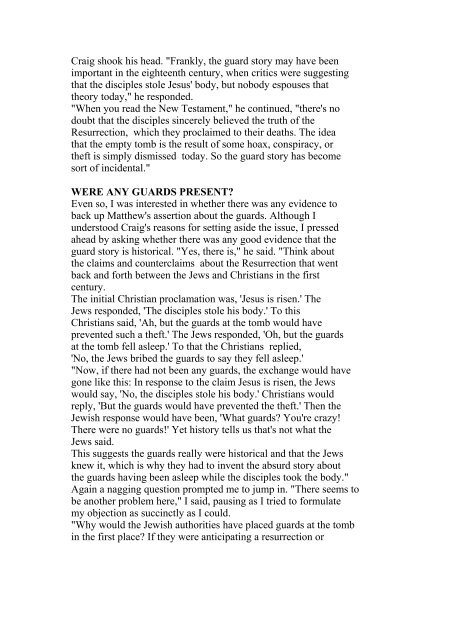The Case For Christ
The Case for Christ records Lee Strobel's attempt to "determine if there's credible evidence that Jesus of Nazareth really is the Son of God." The book consists primarily of interviews between Strobel (a former legal editor at the Chicago Tribune) and biblical scholars such as Bruce Metzger. Each interview is based on a simple question, concerning historical evidence (for example, "Can the Biographies of Jesus Be Trusted?"), scientific evidence, ("Does Archaeology Confirm or Contradict Jesus' Biographies?"), and "psychiatric evidence" ("Was Jesus Crazy When He Claimed to Be the Son of God?"). Together, these interviews compose a case brief defending Jesus' divinity, and urging readers to reach a verdict of their own.
The Case for Christ records Lee Strobel's attempt to "determine if there's credible evidence that Jesus of Nazareth really is the Son of God." The book consists primarily of interviews between Strobel (a former legal editor at the Chicago Tribune) and biblical scholars such as Bruce Metzger. Each interview is based on a simple question, concerning historical evidence (for example, "Can the Biographies of Jesus Be Trusted?"), scientific evidence, ("Does Archaeology Confirm or Contradict Jesus' Biographies?"), and "psychiatric evidence" ("Was Jesus Crazy When He Claimed to Be the Son of God?"). Together, these interviews compose a case brief defending Jesus' divinity, and urging readers to reach a verdict of their own.
Create successful ePaper yourself
Turn your PDF publications into a flip-book with our unique Google optimized e-Paper software.
Craig shook his head. "Frankly, the guard story may have been<br />
important in the eighteenth century, when critics were suggesting<br />
that the disciples stole Jesus' body, but nobody espouses that<br />
theory today," he responded.<br />
"When you read the New Testament," he continued, "there's no<br />
doubt that the disciples sincerely believed the truth of the<br />
Resurrection, which they proclaimed to their deaths. <strong>The</strong> idea<br />
that the empty tomb is the result of some hoax, conspiracy, or<br />
theft is simply dismissed today. So the guard story has become<br />
sort of incidental."<br />
WERE ANY GUARDS PRESENT?<br />
Even so, I was interested in whether there was any evidence to<br />
back up Matthew's assertion about the guards. Although I<br />
understood Craig's reasons for setting aside the issue, I pressed<br />
ahead by asking whether there was any good evidence that the<br />
guard story is historical. "Yes, there is," he said. "Think about<br />
the claims and counterclaims about the Resurrection that went<br />
back and forth between the Jews and <strong>Christ</strong>ians in the first<br />
century.<br />
<strong>The</strong> initial <strong>Christ</strong>ian proclamation was, 'Jesus is risen.' <strong>The</strong><br />
Jews responded, '<strong>The</strong> disciples stole his body.' To this<br />
<strong>Christ</strong>ians said, 'Ah, but the guards at the tomb would have<br />
prevented such a theft.' <strong>The</strong> Jews responded, 'Oh, but the guards<br />
at the tomb fell asleep.' To that the <strong>Christ</strong>ians replied,<br />
'No, the Jews bribed the guards to say they fell asleep.'<br />
"Now, if there had not been any guards, the exchange would have<br />
gone like this: In response to the claim Jesus is risen, the Jews<br />
would say, 'No, the disciples stole his body.' <strong>Christ</strong>ians would<br />
reply, 'But the guards would have prevented the theft.' <strong>The</strong>n the<br />
Jewish response would have been, 'What guards? You're crazy!<br />
<strong>The</strong>re were no guards!' Yet history tells us that's not what the<br />
Jews said.<br />
This suggests the guards really were historical and that the Jews<br />
knew it, which is why they had to invent the absurd story about<br />
the guards having been asleep while the disciples took the body."<br />
Again a nagging question prompted me to jump in. "<strong>The</strong>re seems to<br />
be another problem here," I said, pausing as I tried to formulate<br />
my objection as succinctly as I could.<br />
"Why would the Jewish authorities have placed guards at the tomb<br />
in the first place? If they were anticipating a resurrection or

















